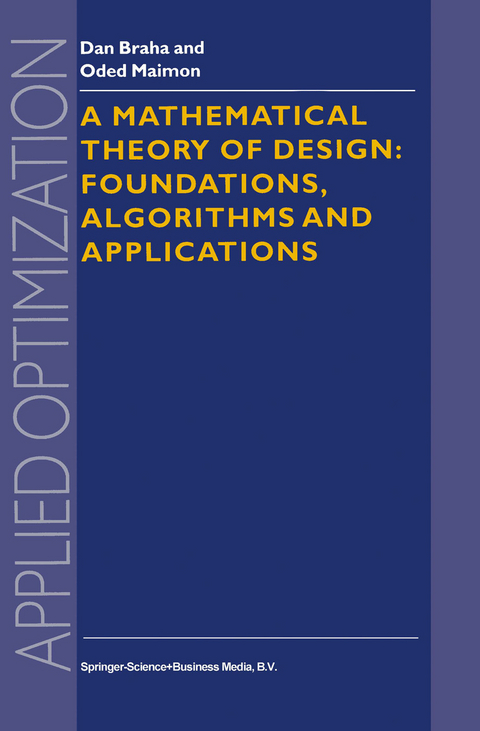
A Mathematical Theory of Design: Foundations, Algorithms and Applications
Springer-Verlag New York Inc.
978-1-4419-4798-7 (ISBN)
Formal Design Theory (PDT) is a mathematical theory of design. The main goal of PDT is to develop a domain independent core model of the design process. The book focuses the reader's attention on the process by which ideas originate and are developed into workable products. In developing PDT, we have been striving toward what has been expressed by the distinguished scholar Simon (1969): that "the science of design is possible and some day we will be able to talk in terms of well-established theories and practices. " The book is divided into five interrelated parts. The conceptual approach is presented first (Part I); followed by the theoretical foundations of PDT (Part II), and from which the algorithmic and pragmatic implications are deduced (Part III). Finally, detailed case-studies illustrate the theory and the methods of the design process (Part IV), and additional practical considerations are evaluated (Part V). The generic nature of the concepts, theory and methods are validated by examples from a variety of disciplines. FDT explores issues such as: algebraic representation of design artifacts, idealized design process cycle, and computational analysis and measurement of design process complexity and quality. FDT's axioms convey the assumptions of the theory about the nature of artifacts, and potential modifications of the artifacts in achieving desired goals or functionality. By being able to state these axioms explicitly, it is possible to derive theorems and corollaries, as well as to develop specific analytical and constructive methodologies.
One The Design Process: Properties, Paradigms and the Evolutionary Structure.- 1 Introduction and Overview.- 2 Design as Scientific Problem-Solving.- 3 Introductory Case Studies.- Two Formal Design Theory (FDT).- 4 Representation of Design Artifacts.- 5 The Idealized Design Process.- 6 Modeling the Evolutionary Design Process.- 7 Guided Heuristics in Engineering Design.- 8 The Measurement of a Design Structural and Functional Complexity.- 9 Statistical Analysis of the Time Complexity Measure.- Three Algorithmic and Heuristic Methods for Design Decision Support.- 10 Intelligent Advisory Tool for Design Decomposition.- 11 Physical Design of Printed Circuit Boards: Group Technology Approach.- 12 Physical Design of Printed Circuit Boards: Genetic Algorithm Approach.- 13 Adaptive Learning for Successful Design.- 14 Maintaining Consistency in the Design Process.- 15 Constraint-Based Design of Faired Parametric Curves.- 16 Creating a Consistent 3-D Virtual Last for Problems in the Shoe Industry.- Four Detailed Design Applications.- 17 Design of a Wormgear Reducer: A Case Study.- 18 Adaptive Learning for Successful Flexible Manufacturing Cell Design: A Case Study.- 19 Maintaining Design Consistency: Examples.- 20 Cases in Evolutionary Design Processes.- Five Practical Considerations.- 21 Concluding Reflections.- References.
| Erscheint lt. Verlag | 6.12.2010 |
|---|---|
| Reihe/Serie | Applied Optimization ; 17 |
| Zusatzinfo | XXII, 682 p. |
| Verlagsort | New York, NY |
| Sprache | englisch |
| Maße | 155 x 235 mm |
| Themenwelt | Mathematik / Informatik ► Informatik ► Theorie / Studium |
| Informatik ► Weitere Themen ► CAD-Programme | |
| Mathematik / Informatik ► Mathematik | |
| Technik ► Maschinenbau | |
| Wirtschaft ► Betriebswirtschaft / Management | |
| ISBN-10 | 1-4419-4798-1 / 1441947981 |
| ISBN-13 | 978-1-4419-4798-7 / 9781441947987 |
| Zustand | Neuware |
| Haben Sie eine Frage zum Produkt? |
aus dem Bereich


